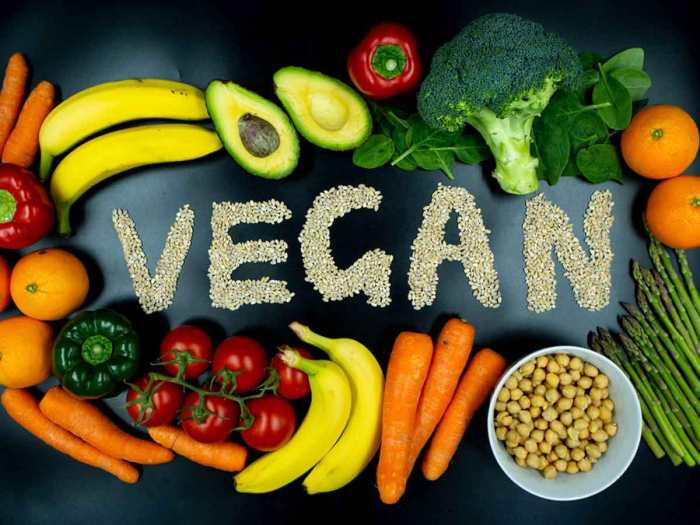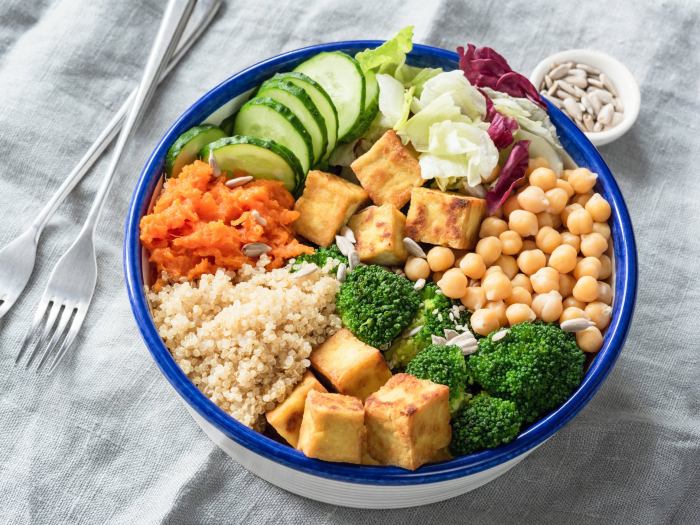Embark on a culinary adventure with a proper vegan diet, where health, ethics, and environmental consciousness intertwine. Discover the essential nutrients, meal planning strategies, and transformative benefits that await you in this comprehensive guide to plant-based living.
From nutrient-rich sources to balanced meal plans, we’ll delve into the secrets of a well-rounded vegan diet. Explore the ethical reasons and environmental impact associated with veganism, empowering you to make informed choices that align with your values.
Nutritional Requirements of a Proper Vegan Diet
A well-balanced vegan diet provides all the essential nutrients required for optimal health. These include:
Protein
- Legumes (beans, lentils, peas)
- Soy products (tofu, tempeh, edamame)
- Whole grains (quinoa, brown rice)
- Nuts and seeds
Protein is crucial for building and repairing tissues, producing enzymes and hormones, and transporting oxygen throughout the body.
Carbohydrates
- Whole grains (brown rice, quinoa, oats)
- Fruits
- Vegetables
- Legumes
Carbohydrates provide energy and fiber, which supports digestive health.
Fats
- Avocado
- Nuts and seeds
- Olive oil
- Flaxseed oil
Fats are essential for hormone production, cell growth, and nutrient absorption.
Vitamins
- Vitamin B12 (fortified foods, nutritional yeast)
- Vitamin D (sun exposure, fortified foods)
- Iron (legumes, fortified cereals)
- Calcium (fortified plant milks, leafy greens)
Vitamins are essential for a wide range of bodily functions, including metabolism, immunity, and nerve function.
Minerals
- Zinc (legumes, nuts, seeds)
- Magnesium (legumes, leafy greens)
- Potassium (fruits, vegetables)
- Sodium (iodized salt)
Minerals support bone health, electrolyte balance, and muscle function.
Potential Nutrient Deficiencies
Vegans may be at risk for deficiencies in certain nutrients, including:
- Vitamin B12
- Iron
- Calcium
- Omega-3 fatty acids
These deficiencies can be addressed by consuming fortified foods, supplements, or by eating a varied and nutrient-rich vegan diet.
Meal Planning for a Balanced Vegan Diet
Meal planning is crucial for a balanced vegan diet. By incorporating a variety of nutrient-rich foods from all food groups, vegans can ensure they meet their daily nutritional requirements.
To create balanced vegan meals, consider the following principles:
- Include a variety of fruits and vegetables:Fruits and vegetables provide essential vitamins, minerals, fiber, and antioxidants.
- Incorporate whole grains:Whole grains, such as brown rice, quinoa, and oatmeal, are excellent sources of fiber, energy, and B vitamins.
- Include plant-based protein sources:Beans, lentils, tofu, tempeh, and nuts are rich in protein, iron, and fiber.
- Use healthy fats:Healthy fats from sources such as avocado, olive oil, and nuts provide essential fatty acids and support hormone production.
- Consider fortified foods:Some foods, such as plant-based milk and cereals, are fortified with essential nutrients like vitamin B12 and calcium.
Sample Meal Plans
Here are sample meal plans that meet daily nutritional requirements for vegans: Day 1:
- Breakfast: Oatmeal with berries and nuts
- Lunch: Lentil soup with whole-wheat bread
- Dinner: Tofu stir-fry with brown rice
Day 2:
If you’re looking for a way to shed those extra pounds, a healthy vegetarian diet plan for weight loss could be the perfect solution. Packed with nutrient-rich fruits, vegetables, and whole grains, a vegetarian diet can help you feel full and satisfied while reducing your calorie intake.
- Breakfast: Smoothie made with fruits, vegetables, and plant-based milk
- Lunch: Salad with grilled tempeh, quinoa, and vegetables
- Dinner: Bean and vegetable chili with cornbread
Strategies for Variety and Nutrient Avoidance
To ensure variety and avoid nutrient deficiencies, vegans should follow these strategies:
- Eat a wide variety of foods:Include foods from all food groups to obtain a diverse range of nutrients.
- Plan meals in advance:This helps ensure you’re consuming a balanced diet and meeting your nutritional needs.
- Read food labels:Check food labels for fortified foods and to monitor nutrient intake.
- Consider supplementation:If necessary, consult with a healthcare professional about supplementing with vitamin B12, iron, or calcium.
Benefits of a Proper Vegan Diet

A well-planned vegan diet offers numerous health benefits. It is rich in fruits, vegetables, whole grains, legumes, and nuts, providing an abundance of essential nutrients. Studies have shown that vegans tend to have lower rates of chronic diseases, such as heart disease, type 2 diabetes, and certain types of cancer.
Reduced Risk of Heart Disease
A vegan diet is naturally low in saturated fat and cholesterol, which are major contributors to heart disease. Plant-based foods are rich in fiber, which helps lower cholesterol levels and improve blood flow. A study published in the American Journal of Clinical Nutrition found that vegans had significantly lower levels of LDL (bad) cholesterol and higher levels of HDL (good) cholesterol compared to non-vegans.
Improved Blood Sugar Control
Vegan diets are typically high in fiber and low in refined carbohydrates, which helps regulate blood sugar levels. Fiber slows down the absorption of sugar into the bloodstream, preventing spikes in blood sugar. A study published in the journal Diabetes Care found that vegans had better blood sugar control and insulin sensitivity than non-vegans.
Reduced Risk of Certain Cancers
Some studies have suggested that a vegan diet may reduce the risk of certain types of cancer, such as colon cancer, breast cancer, and prostate cancer. Plant-based foods are rich in antioxidants and phytochemicals, which have been shown to have anti-cancer properties.
Embarking on a healthy vegetarian diet plan can be a transformative journey for weight loss. Healthy vegetarian diet plans prioritize nutrient-rich fruits, vegetables, whole grains, and legumes, which are low in calories and high in fiber. By incorporating these plant-based foods into your daily routine, you can naturally reduce calorie intake while promoting satiety and overall well-being.
A study published in the journal Cancer Research found that vegans had a 15% lower risk of developing colon cancer compared to non-vegans.
Challenges and Solutions for a Vegan Diet

Adopting a vegan diet can bring about certain challenges that need to be addressed to ensure a balanced and fulfilling lifestyle. Common obstacles include social situations, food availability, and nutritional concerns. By understanding these challenges and implementing practical solutions, vegans can navigate these hurdles and reap the benefits of a plant-based diet.
Social situations often present challenges for vegans as they may encounter limited food options at gatherings or restaurants. To overcome this, vegans can proactively research vegan-friendly establishments or bring their own food to social events. Additionally, they can educate friends and family about their dietary choices to foster understanding and support.
Food Availability
In certain areas, access to a wide variety of vegan foods may be limited. To address this, vegans can explore online grocery stores or specialty shops that cater to their dietary needs. Additionally, they can consider growing their own fruits and vegetables to ensure a steady supply of fresh produce.
Nutritional Concerns
A vegan diet requires careful planning to ensure adequate intake of essential nutrients such as vitamin B12, iron, and calcium. Vegans can consult with a registered dietitian or healthcare professional to develop a personalized meal plan that meets their nutritional needs.
Additionally, they can incorporate fortified foods, such as plant-based milk and cereals, into their diet.
Support Groups and Resources, Proper vegan diet
Connecting with other vegans through support groups or online forums can provide valuable support and resources. These platforms offer a sense of community, recipe sharing, and practical advice from experienced vegans. Additionally, organizations such as the Vegan Society and PETA provide information, advocacy, and support for individuals adopting a plant-based lifestyle.
Ethical and Environmental Considerations

Veganism is not only a dietary choice but also a lifestyle that aligns with ethical and environmental concerns. The ethical reasons for adopting a vegan diet center around the well-being of animals, while the environmental benefits focus on reducing the negative impact of animal agriculture on the planet.
Ethical Reasons
Vegans believe that all animals deserve respect and freedom from exploitation. They oppose the use of animals for food, clothing, or entertainment, as it involves causing pain, suffering, and death. By choosing a vegan lifestyle, they strive to live in harmony with animals and promote their welfare.
Environmental Benefits
Animal agriculture has a significant environmental footprint. The production of meat, dairy, and eggs requires vast amounts of land, water, and energy. It also contributes to greenhouse gas emissions, water pollution, and deforestation.
- Land Use:Raising animals for food requires large amounts of land for grazing, feed production, and waste disposal. In contrast, plant-based foods require significantly less land.
- Water Consumption:Animal agriculture is a major consumer of water. Producing 1 pound of beef, for example, requires approximately 1,800 gallons of water.
- Greenhouse Gas Emissions:Methane, a potent greenhouse gas, is released by livestock during digestion and waste decomposition. Plant-based diets produce significantly fewer greenhouse gas emissions.
By choosing a vegan diet, individuals can reduce their environmental impact and contribute to a more sustainable future.
Final Review
Whether you’re a seasoned vegan or curious about exploring plant-based living, this guide provides invaluable insights and practical solutions. Embrace the transformative power of a proper vegan diet, unlocking a world of health, compassion, and sustainability.
FAQ Explained
What are the key nutrients to consider in a vegan diet?
Vitamin B12, iron, calcium, omega-3 fatty acids, and protein are crucial nutrients that require attention in a vegan diet.
How can I ensure I’m getting enough protein on a vegan diet?
Beans, lentils, tofu, tempeh, and nuts are excellent sources of plant-based protein.
Are there any potential risks associated with a vegan diet?
Vitamin B12 deficiency is a common concern, but it can be easily addressed through fortified foods or supplements.